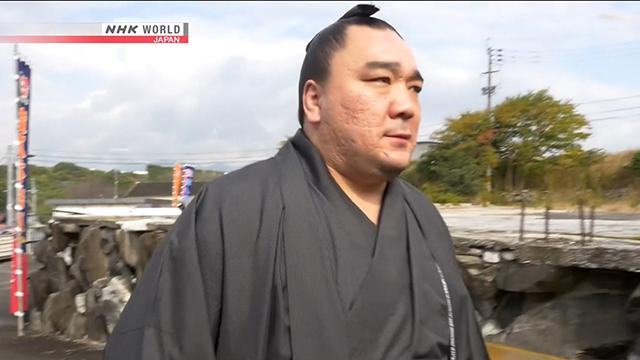Officials say they are setting up a crisis panel to investigate the allegations. A penalty will be handed down after the current Grand Sumo Tournament in Fukuoka ends later this month.
Harumafuji is alleged to have caused serious injury, including a fractured skull, to rank-and-file wrestler Takanoiwa.
The incident took place in Tottori Prefecture, in western Japan, where the two were taking part in an exhibition tour.
Officials say Harumafuji's stablemaster has acknowledged that his grand champion injured Takanoiwa. An apology was issued to Takanoiwa's stablemaster who filed a complaint to the police.
Incident is "disappointing"
Hakkaku, the chairman of the Japan Sumo Association, said it is taking the incident seriously.
"The crisis management panel will carefully investigate the case by verifying each and every fact," he said.
Legal experts on the panel will question wrestlers who witnessed the incident.
Kitanofuji, a former Yokozuna, said the incident is disappointing because sumo wrestlers should present themselves as lovable characters who are giant and kind.
"Being suspended from the current tournament isn't punishment enough," he said.
NHK sumo expert, Hiro Morita, believes this scandal will have broad implications on the future of the sport.
A grand champion, or Yokozuna, is the ultimate symbol of sumo. In Japan, sumo is not just a sport. It represents the country and its people. It began as a Shinto ritual to pray for good harvests and world peace.
Therefore, a grand champion's character is very important. He is expected to possess poise and dignity. As a top-ranking wrestler and a representation of the spirit of sumo, a Yokozuna is supposed to set an example for all of the other wrestlers.
Inside and outside of the ring, a Yokozuna is expected to act with humility and class, and Harumafuji's alleged behavior is far from that. So in the culture of sumo, this is far more serious than an athlete simply striking someone with a beer bottle.
This is not the first time sumo has been rocked by scandal.
About a decade ago, a 17-year-old boy was beaten to death by 3 senior wrestlers during a practice. He had also been severely hazed. The senior wrestlers were all kicked out of sumo and their stablemaster was arrested.
About 7 years ago, another grand champion, Yokozuna Asashoryu, attacked an acquaintance after drinking in a bar. He retired.
There was also a bout fixing scandal about 6 years ago that forced dozens of wrestlers to retire. These incidents all impacted sumo's popularity.
Japan's sumo association has done a lot to try to clean up its image. For example, the association held seminars about good behavior for wrestlers. But this most recent case could once again tarnish sumo's reputation. There could be fewer spectators at future tournaments.
There is also the broader issue of a shrinking number of wrestlers, which could put the existence of Japan's traditional sport into serious jeopardy.
There were close to 1,000 professional wrestlers in the 1990s, but today there are just over 600. A possible factor is Japan's declining birthrate. But, simply put, fewer and fewer kids are taking a crack at sumo these days. And this latest incident won't likely improve the situation. No one wants to send their son to a place that is seen as being filled with violence and scandal.
This scandal represents a serious crisis for the sumo association and it requires a serious response. The association's credibility and sumo's very existence are at stake.
